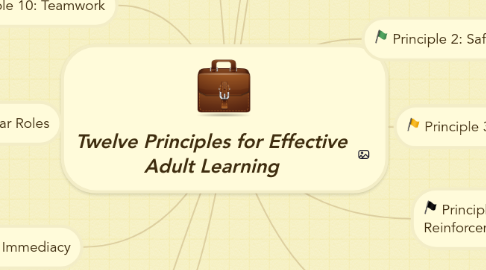Twelve Principles for Effective Adult Learning
omniah ghandourahにより


1. Principle 8: Immediacy
1.1. Experience Rapid Results
1.2. Addressing Content That is Useful NOW
1.3. Time Management with Progressive Practice
1.4. Test Design for Effectiveness and Re-Design for Optimum Results
2. Principle 7: Ideas, Feelings, Actions
2.1. Learning Process Involves Mind and Emotion and Action
2.2. Learners Identify What They Know
2.3. Explore the Cognitive, Affective, and Psychomotor
2.4. Developping Maximum Potential
3. Principle 6: Respect for Learners as Decision Makers
3.1. Know Learner is a Decision Maker
3.2. Inductive and Deductive Learning
3.3. Practice New Skills
3.4. Reflection on Performance
4. Principle 9: Clear Roles
4.1. Clarify Roles in Communication
4.2. Establish Comfort and Equal Say
4.3. Consider Cultural Implications
4.4. Focus on "matter of the heart" and "heart of the matter"
5. Principle 10: Teamwork
5.1. Process and Principle of Shared Responsibility
5.2. Employ Quantum Thinking
5.3. Welcome Competition
5.4. Support Participatory Environment
6. Principle 11: Engagement
6.1. Engage in Strategic Issues
6.2. Emphasise Quantum Thinking as Pleasure and Necessity
7. Principle 12: Accountability
7.1. Esablish Accountability to Group Member
7.2. Establish Accountability to Group as a Whole
7.3. Re-emphasize Quantum Thought Process
8. Principle 1: Needs Assessment
8.1. Assess Abilities and Experiences
8.2. Who, What, and Whom?
8.2.1. Who learns, what is learned, and from whom
8.3. Define Learning Needs
9. Principle 2: Safety
9.1. Respect for Learners
9.1.1. Prerequisites
9.2. Trust the Objectives are Feasible
9.2.1. Task
9.2.2. Prerequisites
9.3. Effectiveness of Learned Information/Material
9.3.1. Task
9.3.2. Prerequisites
